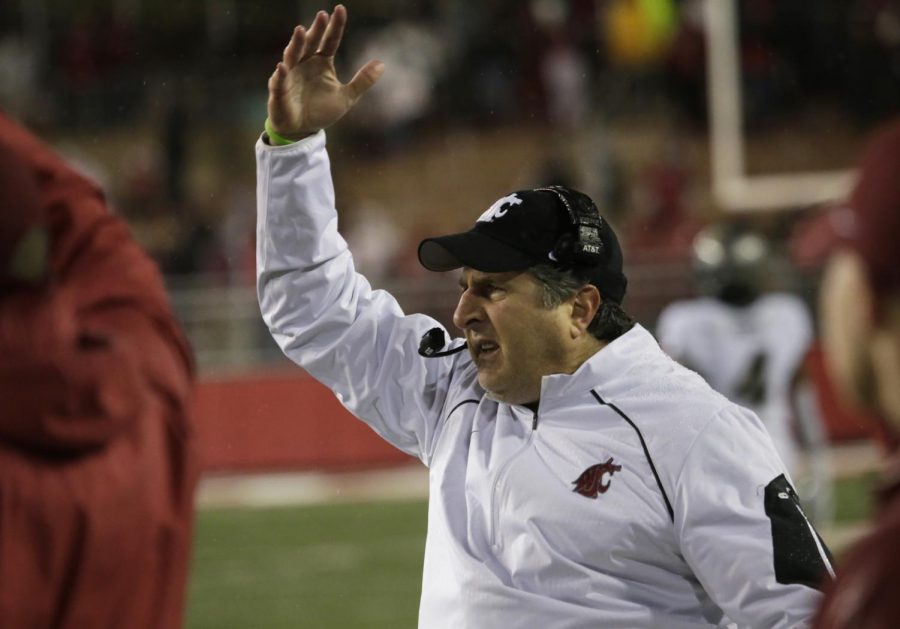Athlete sues over lost scholarship
Suit against WSU, coach, admin claims they did not afford player due process
RYAN PUGH | DAILY EVERGREEN FILE
Football Head Coach Mike Leach tweeted a fake video of a speech in 2014 by former President Barack Obama on Sunday.
March 19, 2018
Former WSU football player Zaire Webb sued Head Coach Mike Leach, the university and three administrators over his dismissal from the team in October of last year.
Webb filed the lawsuit March 2 with the Whitman County Superior Court. The suit names WSU, Leach, Senior Financial Aid Adviser Andrew Lehr, Associate Dean of Students Karen Fischer and Assistant Admissions Director Kelly Myott-Baker as defendants in the case.
Webb named four causes of action in the lawsuit, which included a violation of his 14th Amendment rights, contractual interference, negligence and breaches of his contract. The suit alleges all parties except WSU violated Webb’s constitutional rights, Leach interfered with his scholarship contract, defendants did not conduct a fair hearing and the university failed to uphold its end of the contract.
Leach dismissed Webb and teammate Anthony White Jr. following their involvement in a theft at Walmart on Oct. 4. Police issued the pair with misdemeanor citations for third degree theft. The next day, Webb lost his financial aid effective at the end of the 2017 fall semester following his dismissal the same day, according to court documents.
Webb cited prior inconsistencies in the implementation of team rules as well as problems with the conduct review process.
The lawsuit mentions three players who were named in separate court cases for violent crimes. Leach reinstated the three to the team, even though each broke one of the four rules warranting dismissal that he referenced in a letter to the appeals committee that heard Webb’s case. These rules include drug use, theft, violence against women and anything that could hurt the team, according to the letter.
The first player mentioned was Logan Tago, who was arrested in 2016 and charged with felony robbery and misdemeanor assault, according to court documents. Tago accepted a plea bargain for the third-degree assault charge and WSU lists him as a player on the 2018 spring football roster.
Webb then mentions former player Daquon Brown, who pled guilty to fourth-degree assault following an incident at a dance where he punched a male and a female, knocking the latter unconscious. Leach then allowed Brown to rejoin the team, and Brown led the Cougars in tackles during the 2014 season, according to court documents.
Webb also claimed that then-Athletic Director Bill Moos implied he did not know why Leach reinstated Brown because Moos was not involved in the discipline process. The documents quote Moos as saying, “You’re going to have to talk to Mike about that one. It’s hard for me to believe that he just opened the door for him.”
WSU requires athletic director involvement in disciplinary action stemming from a criminal charge, according to the Student-Athlete Handbook’s Athletics Code of Conduct and Discipline Policy.
Lastly, Webb references current player Grant Porter, who was arrested on Nov. 14 of last year for domestic violence without traumatic injury following an altercation with his girlfriend. Porter was only suspended, not dismissed, and WSU listed him on its 2018 spring roster despite the battery charge still pending in Latah County, Idaho, according to court documents.
Leach wrote a letter to the appeals committee, which consisted of defendants Lehr, Fischer and Myott-Baker, explaining why he dismissed Webb, but didn’t appear before the committee, making his statements unsworn. However, Webb alleges the committee still considered Leach’s statements in their decision-making process.
Due to these measures taken by the appeals committee, Webb claims the defendants acted with the intent to uphold Leach’s decisions instead of giving Webb a fair process, according to court documents. Webb seeks damages in an amount that would be determined during trial.
The lawsuit states the defendants must respond within 20 days of the filing date or a default judgment could be entered against them, meaning Webb would be entitled to the damages he claimed.




















